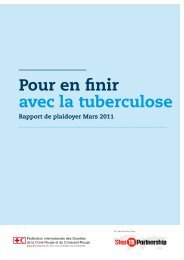Thailand - Stop TB Partnership
Thailand - Stop TB Partnership
Thailand - Stop TB Partnership
You also want an ePaper? Increase the reach of your titles
YUMPU automatically turns print PDFs into web optimized ePapers that Google loves.
Following the initiation of the program, the cure rate in Kilombero jumped from 48 to 78<br />
percent. 58 One district representative commented that the program was able to maintain a<br />
high quality of treatment services at a fraction of the cost to patients because travel costs<br />
had been eliminated. 59 One patient from the Temeke district of Dar es Salaam described the<br />
program as a “savior,” especially for communities far from health facilities or where roads<br />
are impassable during rainy seasons. 60 In Temeke, too, the program both maintained quality<br />
of services and improved cost effectiveness by 37 percent. 61 However, both pilot projects<br />
have now been terminated due to lack of funding. Community health workers continue to<br />
implement some community-based <strong>TB</strong> services on an ad hoc basis, 62 but without financial<br />
support for transportation or training from district health management teams these efforts<br />
have remained limited in scope.<br />
In <strong>Thailand</strong>, village health volunteers and family members assist health workers<br />
in the provision of health services, including the distribution of <strong>TB</strong> drugs and the administration<br />
of DOT. However, there are some indications that the government has not devoted<br />
sufficient attention and resources to providing training and support for these volunteers. In<br />
addition to administering DOT, village health volunteers provide a wide range of primary<br />
health services, including <strong>TB</strong> education, in return for free medical care. Family volunteers<br />
do not receive even this level of compensation. Some village health volunteers report that<br />
they find their jobs are unappealing, 63 and others report that the responsibility of providing<br />
community and patient education is too great to be left to volunteers. 64 Many Thai health<br />
administrators agree that volunteer workers “need to be supported and salaried. We can’t<br />
make them work for free all the time.” 65<br />
Community-based DOTS programs provide a promising model for extending the<br />
capacity of government <strong>TB</strong> programs and engaging affected communities and individuals<br />
in becoming actively engaged in <strong>TB</strong> control efforts. However, Public Health Watch research<br />
suggests that NTP participation and leadership, particularly in providing infrastructural and<br />
technical support and training, may be important if the “scaling-up” and long-term sustainability<br />
of such programs is to be considered.<br />
26<br />
<strong>TB</strong> POLICY IN THAILAND



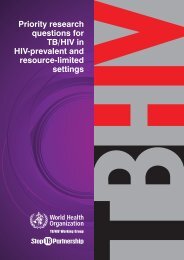
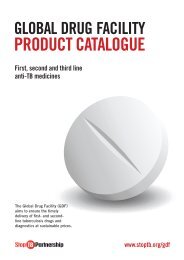
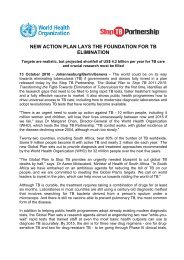
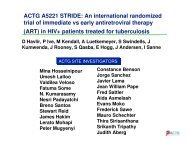
![Global Drug Facility Annual Report 2011 [.pdf] - Stop TB Partnership](https://img.yumpu.com/26788745/1/184x260/global-drug-facility-annual-report-2011-pdf-stop-tb-partnership.jpg?quality=85)

![Concept note on national stop TB partnership [.pdf]](https://img.yumpu.com/26788741/1/184x260/concept-note-on-national-stop-tb-partnership-pdf.jpg?quality=85)

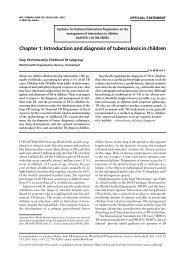
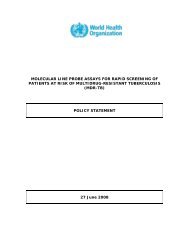
![2005 and Challenges for 2006 - 2015 [.pdf] - Stop TB Partnership](https://img.yumpu.com/26788674/1/190x245/2005-and-challenges-for-2006-2015-pdf-stop-tb-partnership.jpg?quality=85)
![Brochure (French) [.pdf] - Stop TB Partnership](https://img.yumpu.com/17234792/1/190x91/brochure-french-pdf-stop-tb-partnership.jpg?quality=85)

